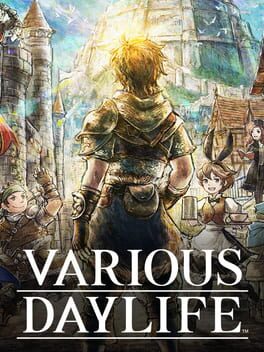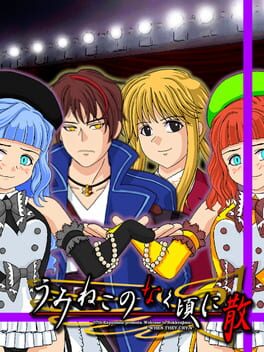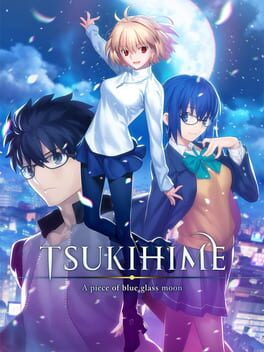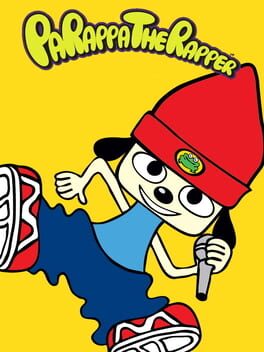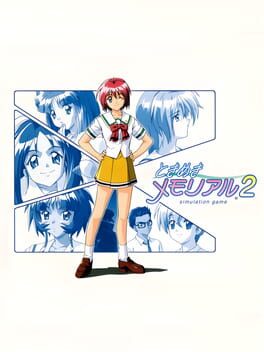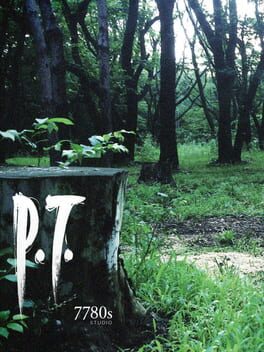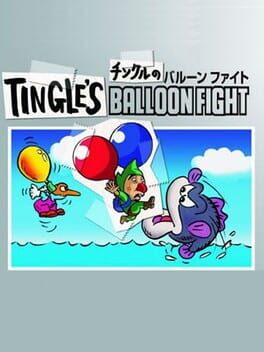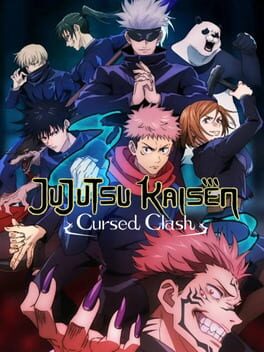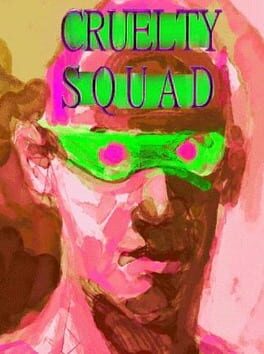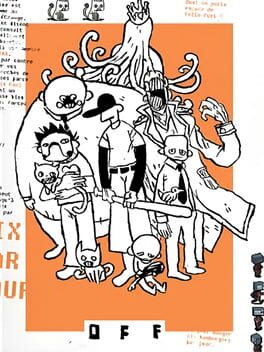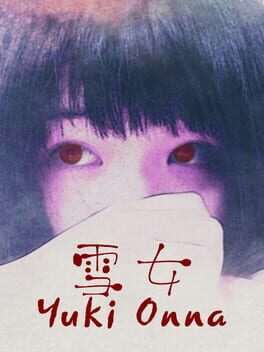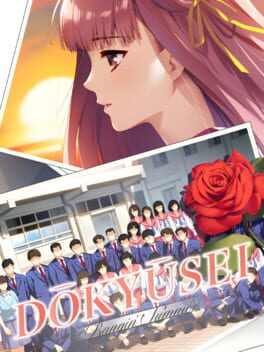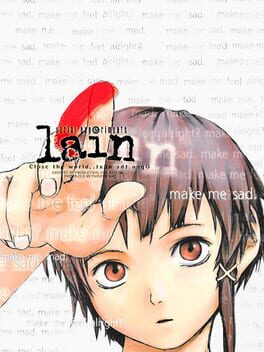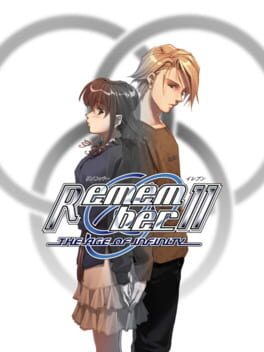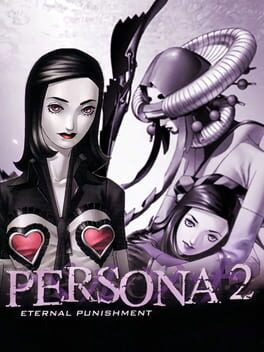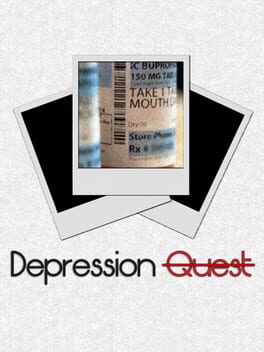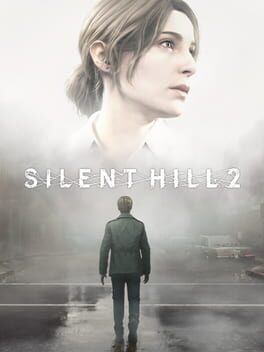mely
38 reviews liked by mely
Various Daylife
2019
You pretentious haters just loathe the idea of innovation in the RPG scene. Maybe if they added the legendary hero, slimes or goblins the turnbasers would eat this shit up. I think you're all just mad because this game is about getting a job and you feel called out. https://careers.mcdonalds.com/
An utterly staggering experience from top to bottom that is equal parts unnerving as it is comforting, erratic as it is deliberate, and heart-warming as it is emotionally devastating, Tsukihime -A piece of blue glass moon- (2021) is a retelling of TYPE-MOONs debut doujin visual novel Tsukihime (2000) that sincerely strives to retain its thematic core and identity, redefined by sweeping scenario changes, new characters and a high production value but ultimately a more experienced Kinoko Nasu through his ambition to tell the story on a grander scale. With this, Tsukihime Remake adapts the entire Near Side segment of the original that only accounts for 2/5 of the routes, which may be surprising but results in a much more dilated and refined experience, one that successfully fills its extended playtime with additional, expanded and rewritten content while also picking up where its predecessor often stumbled, removing its gratuitous adult scenes along with a more tactful handling of its sexual themes. Thoroughly entertaining due to its hyperactive narrative, exciting scenes that utilise its presentation to the fullest, and strong emotional payoffs that all left me craving more by the end.
Right out of the gate one of the most defining aspects of Tsukihime Remake is its remarkable presentation, which oozes quality as every facet of the writing is complemented by both stunning art and animation. For a medium often viewed negatively by those who believe it to be static and unengaging, the remake really pushes the envelope of what it can offer through its commitment to infusing movement into every scene, very rarely sitting still, often utilising varying camera angles between dialogue or slow panning across backgrounds, while additionally shifting through the plentiful amount of character sprites featuring multiple pose variations that greatly enhance character expression and manage to capture a sense of motion unlike most visual novels I’ve played. Perspective is another avenue in which it excels; it’s a genre staple for visual novels to have their characters all lined up together on screen, but instead Tsukihime remake fervently dedicates itself to consistently depicting character distances and positions scene by scene, mapping out their locations in every environment. All this leads to a visually engaging and dynamic experience that never feels overwhelming, as the remake has a confident grasp on how exactly to make the most of its visuals in each scene.
“It’s showtime, vampire.”
Where I think the presentation is at its pinnacle though is during the thrilling action sequences. I swear only TYPE-MOON can captivate me to the point where I’m filled with such childlike glee, twiddling my thumbs on the edge of my seat like a kid again, completely awe-struck with my blood pumping trying to anticipate what happens next as an ominous chanting choir kicks in coupled with Shiki’s hard-edge internal monologuing going off at the same time. I don't agree with the sentiment that the visuals at any point make the game feel like an "anime" as I believe that comparison is neglectful to the importance of the text, the remake manages to strike a solid balance between maintaining the writings importance while featuring fights that bombard you with special effects and animations that ebb and flow seamlessly into the next. The visuals never steal primacy away from the writing, supplementing it to the highest degree which I think is a feat in and of itself. Going further, the sound effects are sharp, the visuals are weighty and unflinching which don't shy away from the innate brutality of Tsukihime, and every action scene is crafted with such a meticulous hand to make them as unpredictable and intense as possible - simply magical.
This more action-oriented approach to an already fantastical narrative manages to remain grounded and down-to-earth in no small part due to the revamped framework it takes place in, Souya city. The dense, quaint atmosphere of Misaki is exchanged in favour of an imposing, bustling and modern Souya city as the narrative scope of Tsukihime is ramped up to go beyond just interpersonal conflicts by now seeping into society as well. Veils of both intrigue and mystery are still blanketed across the setting, an ongoing serial killer case along with talk of suspicious locations in the city churned out by the society rumour mill and yet these happenings don't even begin to shake the daily routines of anybody… life simply has to go on. These everyday moments remain so significant, and where Tsukihime covers a lot of ground with its themes on a smaller but more personal and poignant scale, often through intimate spoken interactions and clashing of worldviews between two closely-knit characters in passive settings such as the local food court or park. Comforting moments like these highlight the fleeting yet precious nature of the story’s two-week timeframe, as to many of its cast they will hold onto these memories forever, memories that are given meaning through the realisation that everything must eventually come to an end.
“Really? I like what-ifs. You might not know where you’re gonna end up, but in the moment you always feel like there's some kind of salvation out there.”
One unambiguous strength of dilating the original is the breadth of characterisation that comes with it; every single character is an infinitely more compelling agent of the story that strengthens not just their individual or interconnected arcs but also the themes of the game, while also staying largely true to their origins - with some slight alterations.
Arcueid remains an absolute joy to watch anytime her vibrant presence is on the screen, such a captivating character who brings life to every single scene she is in, aided by an outstanding performance from her voice actor who perfectly captures her essence. Her character design and behaviour now align more closely with someone of Shiki's age, resulting in a stronger blend of maturity and youth in her character coupled with added depth to her and Shiki’s relationship. Although her route remains very faithful to the original, keeping its identity and greatly enhancing its impact by drawing out scenes and dialogue, it comes at the cost of suffering identically to the original by regularly falling into repetitious heavy-exposition scenes. Shiki is not privy to the world he has unexpectedly been thrown into and the scenario doesn't lend him any agency to uncover its truths on his own, everything is told to him through the actually knowledgeable characters. This reliance on exposition leads to her route occasionally feeling very rhythmic at times, as it also sometimes retreads prior knowledge too, however despite this flaw, and believing that this is where the remake is at its lowest, Arcueid’s charm and chemistry with Shiki shines through brightly, compensating heavily for me not just during these narrative shortcomings but acting as a major strength throughout the entire route. Overall, thanks to a more evocative prose and an improvement in every other element of Arcueid’s story, I still left it with several scenes shattering my heart into pieces.
“I was taught that ‘atonement’ isn’t a destination, but a way of being that is born out of the journey itself. A heart that can punish itself without being forced to by others.”
It's not controversial to say that Ciel's original route was mediocre, failing to differentiate itself sufficiently from its Near Side counterpart and inadvertently placing Arcueid on a higher pedestal due to Ciel’s own route being written in a way that worked against her. In a miraculous turnaround, Ciel’s remake route delivers on a liberal reconstruction that taps into the latent potential its predecessor held, introducing a plethora of changes that are shaped around the retained core ideas of her route, redefining how her story is expressed while maintaining thematic coherence. The result? A complete slam dunk. Nothing short of hyperactive, her route is densely packed, juggling 4 unique plot lines simultaneously as the remake’s willingness to narrate the story from outside Shiki’s perspective really shines here, helping to layer the narrative and provide clarity for when these storylines begin to converge. As a character Ciel is both deep and multi-faceted as the narrative puts her under the magnifying glass and deeply explores every aspect of her character to such a profound level; her connection with Shiki is also the foundation upon which the games most emotional moments are built. The natural evolution of their relationship is very touching, Ciel acts as an anchor to Shiki, the support system he desperately requires, so when their dynamic unravels to the point where it's mirrored, their arcs both reach their crux, culminating in a succession of incredibly moving scenes and dialogue. Aside from just being a very well-written and compelling duo, they are both put forward as the centrepieces for the route's display of its main theme of sin and atonement.
An important distinction to make when discussing Ciel’s route is the 2 different endings it can branch into. Arcueid is given the short end of the stick, her route is not only shorter than Ciel’s but it also only has a singular possible ending compared to Ciel’s normal and true end. Having 2 endings may be concerning for returning fans, since the normal/good ends of the original were very hit or miss, often contradicting the messaging of the true ends by undoing any semblance of tragedy that befell the cast, but in the case of the remake, it separates itself from this prior misstep as the endings are worlds apart. In my opinion, Ciel’s normal ending is the crowning point of not just the remake but Tsukihime as a whole, it’s perfect and I wouldn’t even want to give an idea of what transpires in it. The true end is where things begin to derail as I can’t help but think Nasu got overly ambitious, it's so foreign from anything seen before in Tsukihime, willingly removing itself from many of the games established strengths to try and deliver on an unforgettable spectacle that ends up falling just short. I believe it serves as a solid conclusion for the entire visual novel, but evaluating it in isolation as an end to Ciel’s story, it simply overstays its welcome and lacks thematic substance to it unlike the others.
Most of the new characters are far better integrated into Ciel’s route, with a handful of them taking on major roles that serve to highlight the expanded scope of the story in tandem with its raised stakes, as characters constantly teeter on the borderline between life and death. Going into the remake with the expectation that the new is going to be the brunt of the story will likely leave you disappointed, as while the remake does succeed in adding texture to some of its new side characters, the original cast remains central. Limited character development of some of the new cast stems from the fact that this is a partial release, with certain characters barely having any semblance of characterisation; it's clear a lot is being withheld for the Far Side.
Speaking of the Far Side, the setup for it looks like it's going to be a sweep for Tsukihime -The other side of red garden- (TBD), although this was inevitable since it features the Kohaku route. The foreshadowing runs much deeper, for both old fans and new fans to pick up on, as certain details that the original Near Side clued us in on are omitted or explored differently. Bad ends are a prime example of this, used to great effect to pose interesting scenarios, but also cleverly serve as vital scenes for information that hints at what’s to come. Much of the foreshadowing for the new can be extremely subtle, with certain things I wouldn’t have picked up in a million years because of how skilfully embedded they are. Either way, the fascinating hints and intriguing theories that have emerged from the remake, in conjunction with the vast improvements of the entire Near Side, all point to very promising ideas for the Red Garden.
“No matter how much despair I feel, I’m content simply existing. This is not something that needs to be taught. Just being here like this is enough to give human existence meaning.”
For all the brutality, all the flashy fight scenes, the jokes and quips, the love and tragedy, the growth and self-discovery, Tsukihime is a deeply human story that masks itself behind these ideas, using them to convey its simple but emotive message: despite life's inherently fragile nature, and how meaningless everything might seem - just being here is enough to give existence purpose. The dialect between Arcueid and Shiki at the school, as a soothing canopy of gold paints over the vast canvas of the sky, is one of my favourite scenes in the entire visual novel, as it’s where Tsukihime lays out its philosophy through Shiki. It's here where we understand that Shiki is fundamentally an absurdist, someone who acknowledges the inherent meaninglessness of life and yet revolts against the irresolvable emptiness that often comes from such a realisation, who is able to wake up every day with a positive outlook, content at just being alive, despite his fragile existence, knowing that this is the only form of life he can live, and that if he wants something it can only be seized in this form. Just as he revolts, he lives with passion through wholly embracing the present, not chasing eternity or the divine, nor clinging onto nostalgia and the past. To say life is meaningless is from the perspective of the universe, and as such does not disqualify us from finding our own subjective meaning for certain things in life, as seen by Shiki as he still pursues experiences, fully alive to the present, taking an active role in the narrative by finding fun and purpose in the journey without focusing solely on the destination.
I find Shiki to be a very underappreciated and unique protagonist, he doesn’t go through scathing character development that turns his worldview upside down, rather he maintains a lot of his core beliefs from start to finish, for example how he frequently finds himself returning to the words of Aoko all those many years ago. He’s positioned as the catalyst for the heroines of each route to undergo their arcs, and see them through. The aforementioned conversation he and Arcueid share is beautiful in how it establishes so much about his and her character, and the music that encompasses it is equally as powerful. As someone who often finds themselves stuck in musings about their worth and existence, Shiki’s easy-going attitude and philosophy really spoke to me, however cliché some may believe it to be, but I don’t mind as there is not a stronger or more potent message than one that affirms life.
Ultimately, Tsukihime -A piece of blue glass moon- for all of its flaws was an experience that really landed with me. It’s a remake that is true to its predecessor, maintaining respect for it while understanding things change with the times and making the necessary adjustments without ever straying from its path to remain faithful, and by tapping into the underused potential of the Near Side, it brings missing life to it that also helps to separate it more from the Far Side. Everything just resonated with me so much and I haven’t been able to get Tsukihime out of my head since finishing it.
Right out of the gate one of the most defining aspects of Tsukihime Remake is its remarkable presentation, which oozes quality as every facet of the writing is complemented by both stunning art and animation. For a medium often viewed negatively by those who believe it to be static and unengaging, the remake really pushes the envelope of what it can offer through its commitment to infusing movement into every scene, very rarely sitting still, often utilising varying camera angles between dialogue or slow panning across backgrounds, while additionally shifting through the plentiful amount of character sprites featuring multiple pose variations that greatly enhance character expression and manage to capture a sense of motion unlike most visual novels I’ve played. Perspective is another avenue in which it excels; it’s a genre staple for visual novels to have their characters all lined up together on screen, but instead Tsukihime remake fervently dedicates itself to consistently depicting character distances and positions scene by scene, mapping out their locations in every environment. All this leads to a visually engaging and dynamic experience that never feels overwhelming, as the remake has a confident grasp on how exactly to make the most of its visuals in each scene.
“It’s showtime, vampire.”
Where I think the presentation is at its pinnacle though is during the thrilling action sequences. I swear only TYPE-MOON can captivate me to the point where I’m filled with such childlike glee, twiddling my thumbs on the edge of my seat like a kid again, completely awe-struck with my blood pumping trying to anticipate what happens next as an ominous chanting choir kicks in coupled with Shiki’s hard-edge internal monologuing going off at the same time. I don't agree with the sentiment that the visuals at any point make the game feel like an "anime" as I believe that comparison is neglectful to the importance of the text, the remake manages to strike a solid balance between maintaining the writings importance while featuring fights that bombard you with special effects and animations that ebb and flow seamlessly into the next. The visuals never steal primacy away from the writing, supplementing it to the highest degree which I think is a feat in and of itself. Going further, the sound effects are sharp, the visuals are weighty and unflinching which don't shy away from the innate brutality of Tsukihime, and every action scene is crafted with such a meticulous hand to make them as unpredictable and intense as possible - simply magical.
This more action-oriented approach to an already fantastical narrative manages to remain grounded and down-to-earth in no small part due to the revamped framework it takes place in, Souya city. The dense, quaint atmosphere of Misaki is exchanged in favour of an imposing, bustling and modern Souya city as the narrative scope of Tsukihime is ramped up to go beyond just interpersonal conflicts by now seeping into society as well. Veils of both intrigue and mystery are still blanketed across the setting, an ongoing serial killer case along with talk of suspicious locations in the city churned out by the society rumour mill and yet these happenings don't even begin to shake the daily routines of anybody… life simply has to go on. These everyday moments remain so significant, and where Tsukihime covers a lot of ground with its themes on a smaller but more personal and poignant scale, often through intimate spoken interactions and clashing of worldviews between two closely-knit characters in passive settings such as the local food court or park. Comforting moments like these highlight the fleeting yet precious nature of the story’s two-week timeframe, as to many of its cast they will hold onto these memories forever, memories that are given meaning through the realisation that everything must eventually come to an end.
“Really? I like what-ifs. You might not know where you’re gonna end up, but in the moment you always feel like there's some kind of salvation out there.”
One unambiguous strength of dilating the original is the breadth of characterisation that comes with it; every single character is an infinitely more compelling agent of the story that strengthens not just their individual or interconnected arcs but also the themes of the game, while also staying largely true to their origins - with some slight alterations.
Arcueid remains an absolute joy to watch anytime her vibrant presence is on the screen, such a captivating character who brings life to every single scene she is in, aided by an outstanding performance from her voice actor who perfectly captures her essence. Her character design and behaviour now align more closely with someone of Shiki's age, resulting in a stronger blend of maturity and youth in her character coupled with added depth to her and Shiki’s relationship. Although her route remains very faithful to the original, keeping its identity and greatly enhancing its impact by drawing out scenes and dialogue, it comes at the cost of suffering identically to the original by regularly falling into repetitious heavy-exposition scenes. Shiki is not privy to the world he has unexpectedly been thrown into and the scenario doesn't lend him any agency to uncover its truths on his own, everything is told to him through the actually knowledgeable characters. This reliance on exposition leads to her route occasionally feeling very rhythmic at times, as it also sometimes retreads prior knowledge too, however despite this flaw, and believing that this is where the remake is at its lowest, Arcueid’s charm and chemistry with Shiki shines through brightly, compensating heavily for me not just during these narrative shortcomings but acting as a major strength throughout the entire route. Overall, thanks to a more evocative prose and an improvement in every other element of Arcueid’s story, I still left it with several scenes shattering my heart into pieces.
“I was taught that ‘atonement’ isn’t a destination, but a way of being that is born out of the journey itself. A heart that can punish itself without being forced to by others.”
It's not controversial to say that Ciel's original route was mediocre, failing to differentiate itself sufficiently from its Near Side counterpart and inadvertently placing Arcueid on a higher pedestal due to Ciel’s own route being written in a way that worked against her. In a miraculous turnaround, Ciel’s remake route delivers on a liberal reconstruction that taps into the latent potential its predecessor held, introducing a plethora of changes that are shaped around the retained core ideas of her route, redefining how her story is expressed while maintaining thematic coherence. The result? A complete slam dunk. Nothing short of hyperactive, her route is densely packed, juggling 4 unique plot lines simultaneously as the remake’s willingness to narrate the story from outside Shiki’s perspective really shines here, helping to layer the narrative and provide clarity for when these storylines begin to converge. As a character Ciel is both deep and multi-faceted as the narrative puts her under the magnifying glass and deeply explores every aspect of her character to such a profound level; her connection with Shiki is also the foundation upon which the games most emotional moments are built. The natural evolution of their relationship is very touching, Ciel acts as an anchor to Shiki, the support system he desperately requires, so when their dynamic unravels to the point where it's mirrored, their arcs both reach their crux, culminating in a succession of incredibly moving scenes and dialogue. Aside from just being a very well-written and compelling duo, they are both put forward as the centrepieces for the route's display of its main theme of sin and atonement.
An important distinction to make when discussing Ciel’s route is the 2 different endings it can branch into. Arcueid is given the short end of the stick, her route is not only shorter than Ciel’s but it also only has a singular possible ending compared to Ciel’s normal and true end. Having 2 endings may be concerning for returning fans, since the normal/good ends of the original were very hit or miss, often contradicting the messaging of the true ends by undoing any semblance of tragedy that befell the cast, but in the case of the remake, it separates itself from this prior misstep as the endings are worlds apart. In my opinion, Ciel’s normal ending is the crowning point of not just the remake but Tsukihime as a whole, it’s perfect and I wouldn’t even want to give an idea of what transpires in it. The true end is where things begin to derail as I can’t help but think Nasu got overly ambitious, it's so foreign from anything seen before in Tsukihime, willingly removing itself from many of the games established strengths to try and deliver on an unforgettable spectacle that ends up falling just short. I believe it serves as a solid conclusion for the entire visual novel, but evaluating it in isolation as an end to Ciel’s story, it simply overstays its welcome and lacks thematic substance to it unlike the others.
Most of the new characters are far better integrated into Ciel’s route, with a handful of them taking on major roles that serve to highlight the expanded scope of the story in tandem with its raised stakes, as characters constantly teeter on the borderline between life and death. Going into the remake with the expectation that the new is going to be the brunt of the story will likely leave you disappointed, as while the remake does succeed in adding texture to some of its new side characters, the original cast remains central. Limited character development of some of the new cast stems from the fact that this is a partial release, with certain characters barely having any semblance of characterisation; it's clear a lot is being withheld for the Far Side.
Speaking of the Far Side, the setup for it looks like it's going to be a sweep for Tsukihime -The other side of red garden- (TBD), although this was inevitable since it features the Kohaku route. The foreshadowing runs much deeper, for both old fans and new fans to pick up on, as certain details that the original Near Side clued us in on are omitted or explored differently. Bad ends are a prime example of this, used to great effect to pose interesting scenarios, but also cleverly serve as vital scenes for information that hints at what’s to come. Much of the foreshadowing for the new can be extremely subtle, with certain things I wouldn’t have picked up in a million years because of how skilfully embedded they are. Either way, the fascinating hints and intriguing theories that have emerged from the remake, in conjunction with the vast improvements of the entire Near Side, all point to very promising ideas for the Red Garden.
“No matter how much despair I feel, I’m content simply existing. This is not something that needs to be taught. Just being here like this is enough to give human existence meaning.”
For all the brutality, all the flashy fight scenes, the jokes and quips, the love and tragedy, the growth and self-discovery, Tsukihime is a deeply human story that masks itself behind these ideas, using them to convey its simple but emotive message: despite life's inherently fragile nature, and how meaningless everything might seem - just being here is enough to give existence purpose. The dialect between Arcueid and Shiki at the school, as a soothing canopy of gold paints over the vast canvas of the sky, is one of my favourite scenes in the entire visual novel, as it’s where Tsukihime lays out its philosophy through Shiki. It's here where we understand that Shiki is fundamentally an absurdist, someone who acknowledges the inherent meaninglessness of life and yet revolts against the irresolvable emptiness that often comes from such a realisation, who is able to wake up every day with a positive outlook, content at just being alive, despite his fragile existence, knowing that this is the only form of life he can live, and that if he wants something it can only be seized in this form. Just as he revolts, he lives with passion through wholly embracing the present, not chasing eternity or the divine, nor clinging onto nostalgia and the past. To say life is meaningless is from the perspective of the universe, and as such does not disqualify us from finding our own subjective meaning for certain things in life, as seen by Shiki as he still pursues experiences, fully alive to the present, taking an active role in the narrative by finding fun and purpose in the journey without focusing solely on the destination.
I find Shiki to be a very underappreciated and unique protagonist, he doesn’t go through scathing character development that turns his worldview upside down, rather he maintains a lot of his core beliefs from start to finish, for example how he frequently finds himself returning to the words of Aoko all those many years ago. He’s positioned as the catalyst for the heroines of each route to undergo their arcs, and see them through. The aforementioned conversation he and Arcueid share is beautiful in how it establishes so much about his and her character, and the music that encompasses it is equally as powerful. As someone who often finds themselves stuck in musings about their worth and existence, Shiki’s easy-going attitude and philosophy really spoke to me, however cliché some may believe it to be, but I don’t mind as there is not a stronger or more potent message than one that affirms life.
Ultimately, Tsukihime -A piece of blue glass moon- for all of its flaws was an experience that really landed with me. It’s a remake that is true to its predecessor, maintaining respect for it while understanding things change with the times and making the necessary adjustments without ever straying from its path to remain faithful, and by tapping into the underused potential of the Near Side, it brings missing life to it that also helps to separate it more from the Far Side. Everything just resonated with me so much and I haven’t been able to get Tsukihime out of my head since finishing it.
PaRappa the Rapper
1996
The songs are genuinely good here, especially the frog reggaeton/Shaggy rapper’s song, so much so that I’m not going to mention Daffy slamming his penith in the car door or Batman watching his parents die even once in this whole review. Also this cartoon dog rapper and his talking flower girlfriend is probably the most I’ve ever cared in my life about a straight dude trying to get out of the friendzone
Probably not ever going to play it for real though, the YouTube video I watched was an hour and change long and it included all the times the guy lost. He even said in the comments shit like “😭 I’m on an emulator and the lag is impossible 😭😭😭 if you don’t like it I’d like to see you try it 😭😭😭😭😭😭😭😭.”
Probably not ever going to play it for real though, the YouTube video I watched was an hour and change long and it included all the times the guy lost. He even said in the comments shit like “😭 I’m on an emulator and the lag is impossible 😭😭😭 if you don’t like it I’d like to see you try it 😭😭😭😭😭😭😭😭.”
Tokimeki Memorial 2
1999
P.T.
2014
Far and away the most egregiously misguided attempt at myth-making in games history. This isn't the worst game ever. It's not the weirdest game ever. It is not the 'first American produced visual novel.' Limited Run Games seems content to simply upend truth and provenance to push a valueless narrative. The 'so bad it's good' shtick serves only to lessen the importance of early multimedia CD-ROM software, and drenching it in WordArt and clip art imparts the notion that this digital heritage was low class, low brow, low effort, and altogether primitive.
This repackaging of an overlong workplace sexual harassment/rape joke is altogether uncomfortable at best. Further problematising this, accompanying merch is resplendent with Edward J. Fasulo's bare chest despite him seemingly wanting nothing to do with the project. We've got industry veterans and games historians talking up the importance of digital detritus alongside YouTubers and LRG employees, the latter making the former less credible. We've got a novelisation by Twitter 'comedian' Mike Drucker. We've got skate decks and body pillows and more heaps of plastic garbage for video game 'collectors' to shove on a dusty shelf next to their four colour variants of Jay and Silent Bob Mall Brawl on NES, cum-encrusted Shantae statue, and countless other bits of mass-produced waste that belongs in a landfill. Utterly shameful how we engage with the past.
Bonus Definitive Edition content:
Limited Run Games is genuinely one of the most poorly managed companies on earth and I will never forgive them for giving me a PS5 copy of Cthulhu Saves Christmas instead of what I had actually ordered, a System Shock boxart poster. They also keep sending me extra copies of Jeremy Parish's books. Please, I do not need three copies of Virtual Boy Works.
This repackaging of an overlong workplace sexual harassment/rape joke is altogether uncomfortable at best. Further problematising this, accompanying merch is resplendent with Edward J. Fasulo's bare chest despite him seemingly wanting nothing to do with the project. We've got industry veterans and games historians talking up the importance of digital detritus alongside YouTubers and LRG employees, the latter making the former less credible. We've got a novelisation by Twitter 'comedian' Mike Drucker. We've got skate decks and body pillows and more heaps of plastic garbage for video game 'collectors' to shove on a dusty shelf next to their four colour variants of Jay and Silent Bob Mall Brawl on NES, cum-encrusted Shantae statue, and countless other bits of mass-produced waste that belongs in a landfill. Utterly shameful how we engage with the past.
Bonus Definitive Edition content:
Limited Run Games is genuinely one of the most poorly managed companies on earth and I will never forgive them for giving me a PS5 copy of Cthulhu Saves Christmas instead of what I had actually ordered, a System Shock boxart poster. They also keep sending me extra copies of Jeremy Parish's books. Please, I do not need three copies of Virtual Boy Works.
pretty disapponted tbh! the ease in air control is probably for the better. being stuck with a single balloon in the original was kind of hellish, but added depth. the illusion of depth is present in Tingle's focus on vertically oriented levels spanning between the system's two screens. despite being a novel and expected idea, it detracts from the game's structure as a whole. while the race towards the top of the screen can be somewhat thrilling, the round is pretty much over once you reach it. there's usually only one cpu hanging near the cutoff point, and after you bop one, the rest will follow in an orderly fashion.
the upper edge plays a more dramatic role in original game. cpus tend to flock there, and you have less space to work with, due to the claustrophobic platform placement, smaller screen size, and boundary-hugging ai, you're often trapped between a couple enemies and obstacles, tension rising, all while a parachuting foe is slowly swaying down to the surface, ready to pump a spare balloon full of air and come back for revenge.
stuff like that doesn't happen in Tingle's, which is a bummer. they totally could have tuned things more aggressively! the game gives you unlimited continues, sending you back to the start of the same round after your lives are depleted. i think this alone is enough to slather levels with obstructions. unfortunately, every round is the same as the last. if you manage to do the chore of clearing all 99 of them, you unlock an alternative mode consisting of faster opponents, buuuuuuuut... after its unlocked...
...!!!the game's save function is fucking disabled!!!
the button to start from the stage you quit on is replaced by the "Game B" option or whatever!!!! this applies to both versions of single-player balloon fight, and the same thing occurs after unlocking the EX version of balloon trip as well! i'd be willing to play through both difficulties to see how much the added challenge benefits, but idk, i don't feel like leaving my ds in sleep mode and i definitely don't wanna do it all in one go...
something else that sucks but not nearly as much as that: the flippers! in the original balloon fight, they flung you around and it was equal parts fun and obnoxious. in this version they just push you back a teensy bit. its so lame... subdued. antithetical of tingle himself. i understand why the game is the way it is, but i desire a version of this that was more than just a promotional reward made by some interns. by the namesake, it deserved to be stupid and experimental. i want a revival of this series with ridiculous stage gimmicks and silly items...
the upper edge plays a more dramatic role in original game. cpus tend to flock there, and you have less space to work with, due to the claustrophobic platform placement, smaller screen size, and boundary-hugging ai, you're often trapped between a couple enemies and obstacles, tension rising, all while a parachuting foe is slowly swaying down to the surface, ready to pump a spare balloon full of air and come back for revenge.
stuff like that doesn't happen in Tingle's, which is a bummer. they totally could have tuned things more aggressively! the game gives you unlimited continues, sending you back to the start of the same round after your lives are depleted. i think this alone is enough to slather levels with obstructions. unfortunately, every round is the same as the last. if you manage to do the chore of clearing all 99 of them, you unlock an alternative mode consisting of faster opponents, buuuuuuuut... after its unlocked...
...!!!the game's save function is fucking disabled!!!
the button to start from the stage you quit on is replaced by the "Game B" option or whatever!!!! this applies to both versions of single-player balloon fight, and the same thing occurs after unlocking the EX version of balloon trip as well! i'd be willing to play through both difficulties to see how much the added challenge benefits, but idk, i don't feel like leaving my ds in sleep mode and i definitely don't wanna do it all in one go...
something else that sucks but not nearly as much as that: the flippers! in the original balloon fight, they flung you around and it was equal parts fun and obnoxious. in this version they just push you back a teensy bit. its so lame... subdued. antithetical of tingle himself. i understand why the game is the way it is, but i desire a version of this that was more than just a promotional reward made by some interns. by the namesake, it deserved to be stupid and experimental. i want a revival of this series with ridiculous stage gimmicks and silly items...
Supercow
2022
3 lists liked by mely
